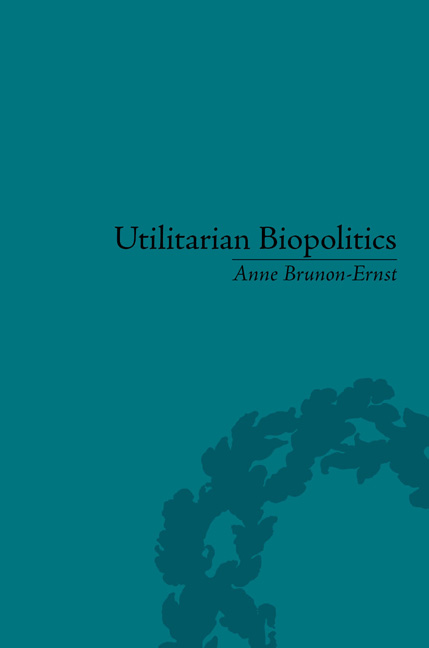Book contents
- Frontmatter
- CONTENTS
- Acknowledgements
- General Introduction
- Part I Biopolitics of Interests Introduction: From Interest to Norms
- Part II Utilitarian Conduct of Conduct Introduction: Legal Norms, Extra-Legal Norms and Utilitarian Conduct
- Part III The Biopolitical Expert Introduction: The Moralist and the Economist
- Epilogue: (De)Constructing Biopolitics
- Notes
- Works Cited
- Index
Part II - Utilitarian Conduct of Conduct Introduction: Legal Norms, Extra-Legal Norms and Utilitarian Conduct
- Frontmatter
- CONTENTS
- Acknowledgements
- General Introduction
- Part I Biopolitics of Interests Introduction: From Interest to Norms
- Part II Utilitarian Conduct of Conduct Introduction: Legal Norms, Extra-Legal Norms and Utilitarian Conduct
- Part III The Biopolitical Expert Introduction: The Moralist and the Economist
- Epilogue: (De)Constructing Biopolitics
- Notes
- Works Cited
- Index
Summary
When one speaks of power, people immediately think of a political structure, a government, a dominant social class, the master and the slave, and so on. I am not thinking of this at all when I speak of relations of power. I mean that in human relationships, whether they involve verbal communication … or amorous, institutional, or economic relationships, power is always present: I mean a relationship in which one person tries to control the conduct of the other.
Power … is the power of disposing of certain things and certain services of certain persons with a view to a certain end.
Bentham identifies three ways in which one can influence conduct: direct legislation, indirect legislation and private deontology. The aim of Part II is to examine the first two ways in which individuals and institutions control behaviour and to see how they can be read in terms of Foucault's conduct of conduct. Chapter 3 will consider the role of law in social control, and Chapter 4 examines the impact of the provisions of indirect legislation on the modification of human behaviour.
Part I of this book established a certain number of points concerning Bentham and Foucault's theories. First, it examined how pleasure and pain could operate in a biopolitical environment. The study showed that pleasures and pains could only function if they were considered as norms. This is true of Bentham's theory: the utility principle (where utility is understood as interests) is now to be understood as a norm.
- Type
- Chapter
- Information
- Utilitarian BiopoliticsBentham, Foucault and Modern Power, pp. 49 - 50Publisher: Pickering & ChattoFirst published in: 2014



